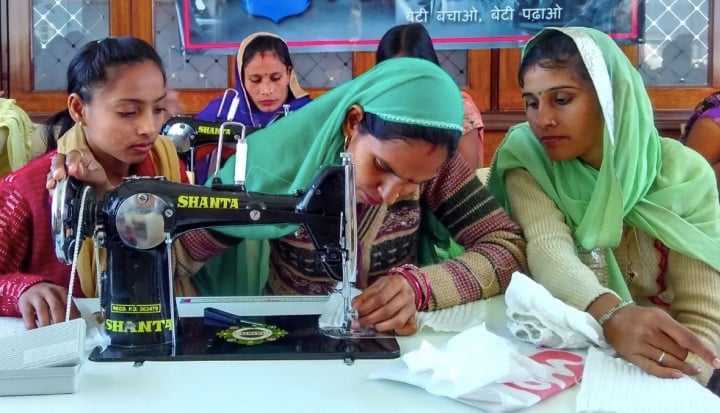Impact champions such as India’s Empower Pragati are turning the impact measurement field around. Rather than defining impact based on past activities, they are using ongoing business activities to guide how they chart the course for the future
Unemployment is a country-wide issue in India, and the nation’s youth are hardest hit. A staggering one in three young Indians are unemployed, according to a recent OECD report. To help tackle this, India-based social enterprise Empower Pragati is providing vocational training to 2 million low-income youth across 22 states, creating opportunities for them to lead productive, financially secure lives.
The company uses impact measurement – the gathering of social, environmental and governance data to measure its contribution to the sustainable development goals (SDG) – to ensure its training programmes are tailored to the needs of its current and future students. Based on this, it offers training in a range of in-demand sectors such as hospitality, tourism, beauty and wellness, telecommunications, information technology and IT-enabled services, banking and finance, food processing, health and agriculture. In addition, Empower Pragati has partnered with the government of India to implement a national skills qualifications framework, which standardises skillsets required for a range of different jobs to establish a fairer playing field for job seekers. The partnership also enables Empower Pragati to provide key insights to improve government policy around vocational training.
Empower Pragati’s success is not just measured by profit; the number of graduates who find work after completing training is also an important measure of whether they’re achieving their goal of helping India’s young people break pervasive patterns of unemployment. Therefore, understanding the impact their company is having on the lives of the youth, their standard of living, and economic potential is crucial. Impact data generates valuable insights that the company can use to make better business decisions that can help them achieve their goals more effectively. Used strategically, impact management can also shed a guiding light on the future direction of the company.
Measurement for the sake of understanding impact (and not simply to report on targets) opens the pathway to better inclusive business management. This is a shift away from traditional impact assessment, which focused on proving past impact to attract investments, towards managing impact in a way that helps businesses improve outcomes for its customers now and in the future. To do this, impact measurement must be integrated within company operations as a continuous process, rather than an ad hoc activity pursued at the behest of funders.
Rajiv Sharma, founder and managing director of Empower Pragati, says: “Studying the impact of our programmes, as well as our contribution to government-led initiatives such as vocational training-focused Skill India mission, is essential for the growth of the vocational education sector. This helps us to make continuous progress towards sustainability of our business as well as to align our goals to achieve the SDGs.”
The benefits of this proactive approach to impact management is twofold. Not only is it creating opportunities for its students, it also reaps benefits that are directly linked with driving business value: assessing market opportunities and risks, improving products and services, deepening engagement with customers, building brand and reputation, and scaling its impact.
To adapt to this new approach to impact management, Empower Pragati conducted a rigorous impact measurement exercise as part of Business Call to Action’s (BCtA) impact measurement services (IMS) in 2015, along with 20 other inclusive businesses who committed to examining the impact they were having on the lives of the students and the overall community. Empower Pragati surveyed 17 out of its 25 schools in Himachal Pradesh, collecting data on the training, employment prospects, incomes and standard of living from students, teachers and parents.
The company’s deep dive into its operational data, along with comprehensive feedback taken from stakeholders, revealed there was a low demand for vocational training graduates in the targeted job market: only 8% of industry respondents stated that there were full-time positions for graduates over the age of 18. Moreover, less than one third of employers were willing to support part-time employees to gain further education. Such data points give insights into the reality of the job market.
Empower Pragati needed this kind of data to not only improve its internal decision-making, but to also advocate its government partners to ensure that policy is more inclusive. It indicates that employers have to be onboard with the Skill India mission in order to make it a success. All stakeholders in the system rooting for youth employment must join hands and work to achieve the mutual goal.
Since it embarked on this journey four years ago, Empower Pragati has kept impact management at the core of its operations. Motivated by the success of this first impact measurement process, today, the company is committing once again to measure how its trainings are driving employment prospects for its graduates and how it can improve programme design to achieve impact. Empower Pragati is one of 25 impact champions who will go through a one-year programme run by BCtA that helps businesses plan, measure, understand and manage their impact.
Pritha Dutt, Empower Pragati’s director of quality training and placements, believes that “measuring real-time impact on the youth that we engage with gives the necessary feedback, to help us improve and revitalise our initiative. It’s important to find out how and to what extent their lives are transformed”.
This article first appeared in Business Call to Action’s Guardian Lab, Improving Lives through Business Innovation.










